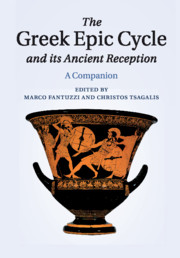Book contents
- Frontmatter
- Contents
- List of illustrations
- List of contributors
- Editorial note
- Introduction: Kyklos, the Epic Cycle and Cyclic poetry
- PART I APPROACHES TO THE EPIC CYCLE
- 1 Coming adrift: The limits of reconstruction of the cyclic poems
- 2 Oral traditions, written texts, and questions of authorship
- 3 The Epic Cycle and oral tradition
- 4 The formation of the Epic Cycle
- 5 Motif and source research: Neoanalysis, Homer, and Cyclic epic
- 6 Meta-Cyclic epic and Homeric poetry
- 7 Language and meter of the Epic Cycle
- 8 Narrative techniques in the Epic Cycle
- 9 Wit and irony in the Epic Cycle
- 10 The Trojan War in early Greek art
- PART II EPICS
- PART III THE FORTUNE OF THE EPIC CYCLE IN THE ANCIENT WORLD
- Works cited
- Index of principal passages
- Index nominum et rerum
7 - Language and meter of the Epic Cycle
from PART I - APPROACHES TO THE EPIC CYCLE
Published online by Cambridge University Press: 05 August 2015
- Frontmatter
- Contents
- List of illustrations
- List of contributors
- Editorial note
- Introduction: Kyklos, the Epic Cycle and Cyclic poetry
- PART I APPROACHES TO THE EPIC CYCLE
- 1 Coming adrift: The limits of reconstruction of the cyclic poems
- 2 Oral traditions, written texts, and questions of authorship
- 3 The Epic Cycle and oral tradition
- 4 The formation of the Epic Cycle
- 5 Motif and source research: Neoanalysis, Homer, and Cyclic epic
- 6 Meta-Cyclic epic and Homeric poetry
- 7 Language and meter of the Epic Cycle
- 8 Narrative techniques in the Epic Cycle
- 9 Wit and irony in the Epic Cycle
- 10 The Trojan War in early Greek art
- PART II EPICS
- PART III THE FORTUNE OF THE EPIC CYCLE IN THE ANCIENT WORLD
- Works cited
- Index of principal passages
- Index nominum et rerum
Summary
Introduction
Like the poetry attributed to Homer and Hesiod, the poems of the Cycle are written in a literary dialect which does not correspond to any real dialect of Ancient Greek. This dialect was so closely associated to the genre itself that it was used by epic poets from different periods and it remained without major changes for centuries, when dialectal variations were replaced by a common form of Greek, the koinē. This is, thus, a distinguishing trait of the epic genre.
The dialect is basically Ionic, but with certain elements from other dialects. In general, the great majority of these features are archaisms that have been preserved in order to maintain the metrical structure.
The original date of the Cyclic poems has been much debated. Some of them have been traditionally ascribed to the early archaic period, although Wilamowitz, Wackernagel, and, recently, Davies reduce this dating in a considerable way. The two main linguistic arguments to support a later date (like the fifth century BC) are: the so-called Atticisms and the diction that is considered ‘late’. Regarding the former, modern authors like Janko, Richardson, or Burgess have revealed that many of the supposed examples are not Atticisms. With respect to diction, the label ‘late’ is simply based on the fact that the term is not attested in the archaic literature preserved to us. Yet, if we consider the remarkable number of Homeric or Hesiodic hapax that reappeared only much later, we must play down the importance of these arguments. For example, ἀλυκτοπέδαι ‘bonds’ is documented just once in the archaic epic (Hes. Theog. 521). If Hesiod had decided to use another word in that verse, all the modern critics would have diagnosed the unequivocal Hellenistic and Imperial character of this term, since it would only appear in Apoll.Rh. 2.1249, Opp. Hal. 2.285, Triph. 480, and Nonn. Dion. 2.302. It is illusory to think that, taking into account the important number of archaic poems that are lost, we can identify a term as ‘late’ only because this word is not documented in Homer or Hesiod.
- Type
- Chapter
- Information
- The Greek Epic Cycle and its Ancient ReceptionA Companion, pp. 139 - 153Publisher: Cambridge University PressPrint publication year: 2015



